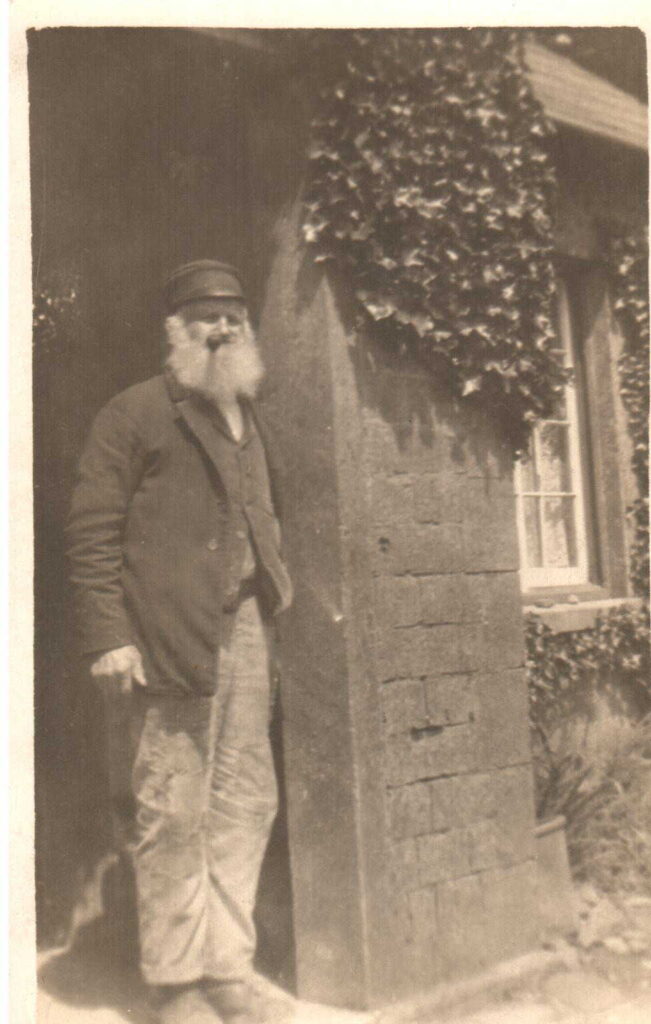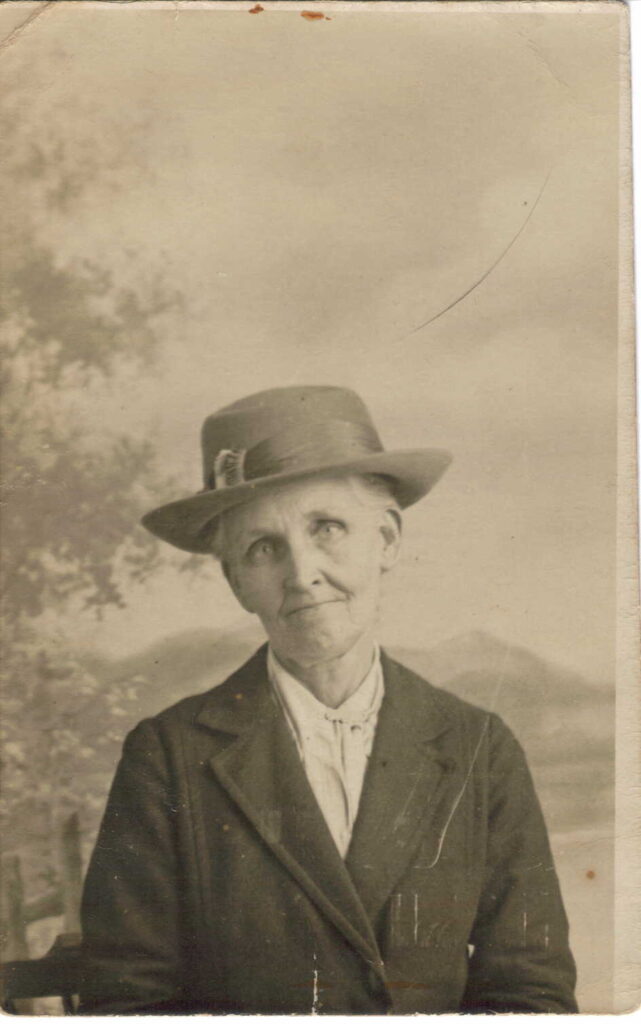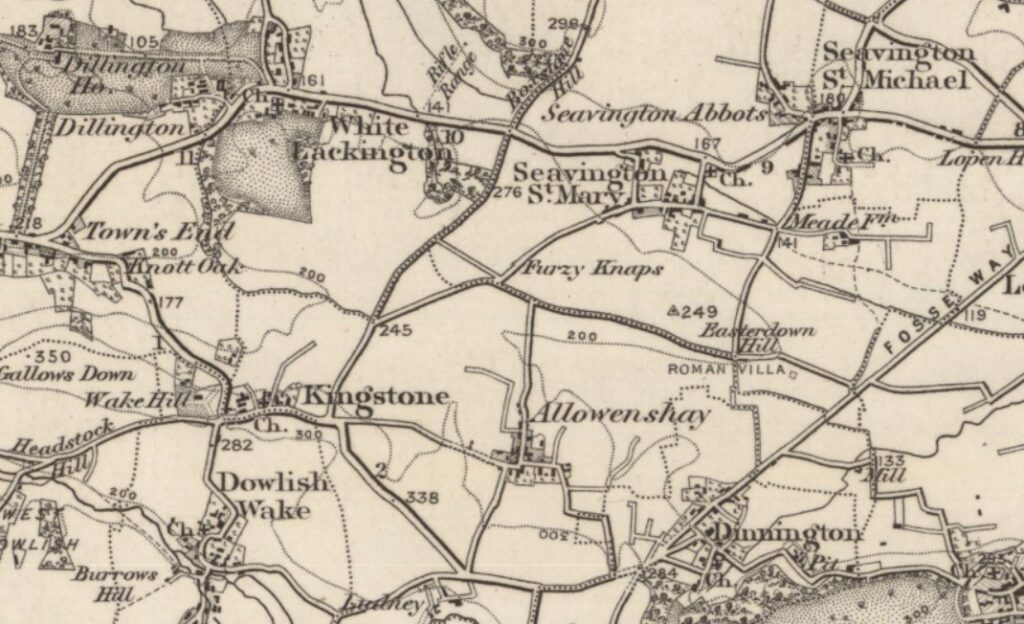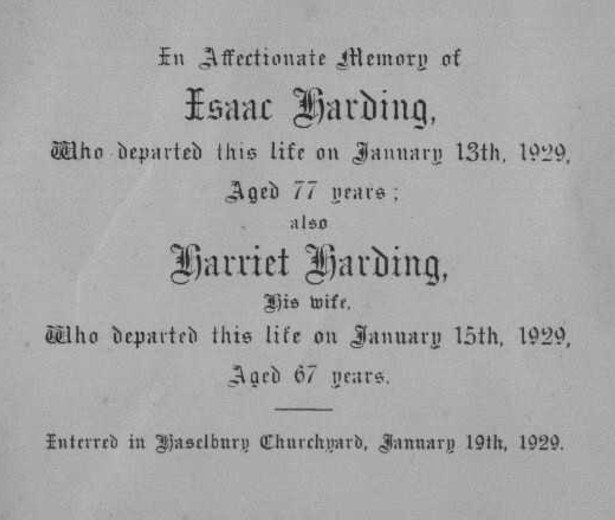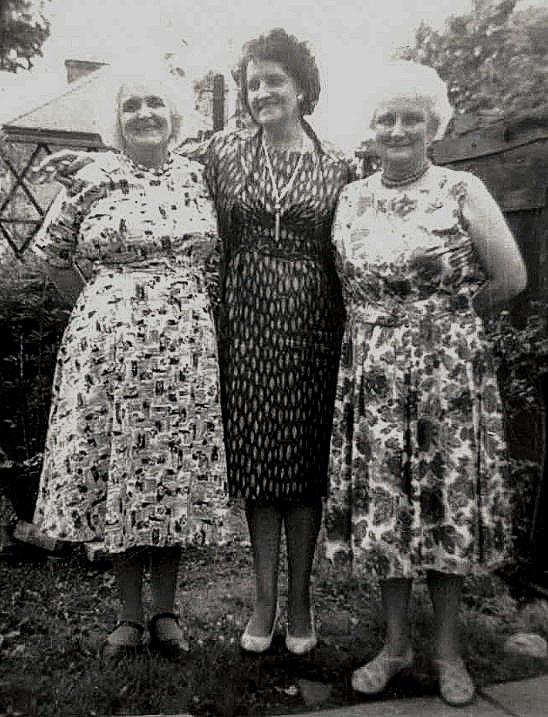Introduction
Isaac Harding spent nearly fifty years close to his home parish of Seavington St Mary before moving to Hardington and later to Haselbury. After experiencing profound sadness due to the death of his ten-year-old son and his first wife, he found new happiness with his second wife, Harriet. He had a large family and three of his children emigrated to Canada, and four moved to the London area. Near the end of his life, he benefited from the breakup of the Portman Estate.
Birth
Isaac, the second child of Thomas and Mary Anna Harding, was born at Seavington St Mary in 1851. His father, Thomas, was a farm labourer.
Occupation
Isaac was a farm labourer by age eight and continued in this occupation until about the age of seventy. Like his older sister, Mary Ann, who lived at Seavington St Mary and Whitelackington her whole life, Isaac was rooted in his home area. This rootedness was in contrast to his three brothers, two of whom emigrated to Australia while the other moved to Cardiff.
First marriage
On 24 December 1873, at Kingstone parish church, Isaac married Hephzibah Jane Seward, the daughter of George and Charlotte Seward. Hephzibah’s father was a shoemaker, and her mother was a schoolmistress and glover.
The names of Hephzibah and her siblings, Japheth and Virtue, suggest that she came from a pious household steeped in the Old Testament.
Isaac and Hephzibah lived at Allowenshay, Seavington St Mary and Whitelackington, and they had four sons and three daughters.
Drunk and disorderly
On 29 July 1885, at Ilminster Petty Sessions, Isaac and another farm labourer were charged with being drunk and disorderly. The magistrates fined each of them 2s.[2] This appears to have been an isolated incident.
Son’s chronic illness.
Isaac and Hephzibah’s son, James, born on 16 July 1881, suffered from pernicious anaemia from birth. This is an autoimmune disease that causes a deficiency in vitamin B12, resulting in tiredness, shortness of breath, pale skin, and neurological damage.[3] He died from the disease on 22 March 1892 at the age of ten.[4]
Hephzibah’s death
James’s condition may have contributed to Hephzibah’s increasing nervous anxiety, which became acute and debilitating from about 1891 After two years, her body became severely weakened, and she died on 28 January 1893, at the age of 40.[5]
Her untimely death left Isaac as the sole caregiver for their three children still at home: Thomas (9), Fred (8) and Lily (4). Finding a caregiver for them likely became his priority.
Second marriage
On 24 February 1894, Isaac married Harriet Ball at Seavington St Mary parish church.
Ten years younger than Isaac, Harriet grew up in a household similar to his, with her father, James Ball, working as a farm labourer at Dinnington and Kingstone. However, Harriet moved to London in her teens and spent over ten years as a general servant in lower middle-class homes in Hornsey and Hackney. The knowledge and confidence she gained in London may have influenced Isaac’s decision to seek work further afield.
Hardington
Around 1899, Isaac and Harriet moved to Hardington, where they lived initially in the High Street and later at Hardington Marsh.[6] When they moved to Hardington, their household included their first child, Emma, along with Isaac’s children, Fred and Lily.[7] A son, James, and two more daughters, Eva and Nellie, were born at Hardington.
Diaspora of Isaac’s children
By 1921, Isaac’s children were widely scattered: one lived in Cardiff, four were in the London area, two were in Somerset, and three had emigrated to Canada.
Move to Haselbury
Between 1915 and 1920, Isaac and Harriet moved to Haselbury.
Underpaid by his employer
Towards the end of his life, Isaac suffered severely from rheumatism, likely the result of hard, backbreaking work in all weathers. A Haselbury farmer, Frederick Symes, used Isaac’s ailments as an excuse not to pay him the statutory wage. On 10 January 1920, the Agricultural Wages Board summoned Symes under the Corn Production Act of 1917 for not paying Isaac the fixed rate of wages. They established that Symes had paid Isaac 19s for a 54-hour week, which was well below the rate set by law. Symes’s defence that Isaac was not an able-bodied man carried no legal weight. The magistrates ordered Symes to pay Isaac wage arrears of £24.[8]
Freeholder
In September 1924, Viscount Portman sold many properties in Haselbury and East Chinnock to pay death duties, offering his tenants preferential treatment as buyers. Isaac bought a pair of bungalow cottages at Haselbury, of which he was the tenant of one, for £130.
Isaac’s lump sum payment of wages arrears may have given him the means to buy the property. If he had to take out a loan, he may have repaid it by selling one of the bungalows (possibly achieving as much for one as he paid for the pair).
Death
Isaac died at Haselbury on 13 January 1929, and Harriet died three days later.
Despite owning property, neither Isaac nor Harriet left a will, nor did any probate registry grant letters of administration for their estates.
References
[1] Guardian valuations.
[2] Chard and Ilminster News, 1 August 1885, p.5.
[3] Western Gazette, 29 July 1881, p.1. James Harding’s death certificate.
[4] James Harding’s death certificate.
[5] Western Gazette, 3 February 1893, p.8.
[6] The 1900 voters’ list recorded Isaac occupying a house in the High Street. The voters’ lists from 1902 to 1914 recorded him occupying a house at Hardington Marsh.
[7] In March 1901, Isaac’s son, Fred, was a groom on a farm, living at North Lane, Hardington, with John Robert Leach, while his son, Thomas, was a coal hewer at Pontypridd.
[8] Western Chronicle, 16 January 1920, p.11.
